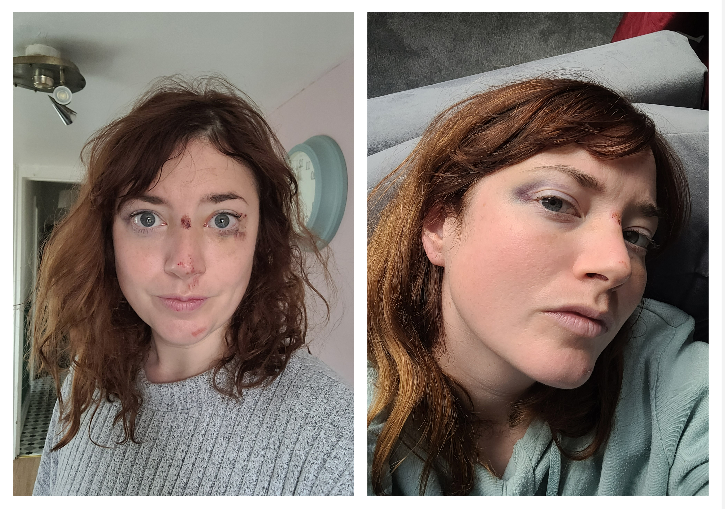I was spiked: here’s why I wish it had been recognised as a stand-alone crime
Drink spiking is finally about to be made a specific offence, with jail time of up to 10 years for perpetrators. Helen Coffey describes what the experience is like – and why this new recognition will help victims come forward


Your support helps us to tell the story
From reproductive rights to climate change to Big Tech, The Independent is on the ground when the story is developing. Whether it's investigating the financials of Elon Musk's pro-Trump PAC or producing our latest documentary, 'The A Word', which shines a light on the American women fighting for reproductive rights, we know how important it is to parse out the facts from the messaging.
At such a critical moment in US history, we need reporters on the ground. Your donation allows us to keep sending journalists to speak to both sides of the story.
The Independent is trusted by Americans across the entire political spectrum. And unlike many other quality news outlets, we choose not to lock Americans out of our reporting and analysis with paywalls. We believe quality journalism should be available to everyone, paid for by those who can afford it.
Your support makes all the difference.That’s a word for ‘hangover’ I haven’t heard before – I might start saying that every time I get too pissed!”
The man in the pub laughed with his whole body: a deep, proper belly laugh. He was extremely tickled by his joke. I smiled weakly in response.
This virtual stranger, an acquaintance’s brother, had asked me about my face: the crusting, maroon-coloured scab between my eyebrows, standing out like an attention-seeking toddler screeching “Look at me!”; the bloody cut at the top of my lip; the scratches smattered across my chin and nose; and, most blatant of all, the bruises circling my eyes. They had developed over the past few days, transitioning from yellowy beige to a sweep of blue-tinged mauve. In certain lights, I could almost pretend they looked cool. Almost.
It was a face that had attracted a lot of attention; people aren’t used to seeing women with black eyes. Kindly strangers had stopped me in the street and sidled up to me in coffee shops to check whether I was OK – the unspoken question being whether someone did this to me. Whether a man did this to me.
The answer is probably yes, though not in the way you might imagine. I’d told the acquaintance’s brother that I believed I’d been spiked while out for after-work drinks, and that my injuries were a result of falling on my face, over and over and over, while unable to walk during the (usually) 10-minute journey home. His reaction – an eye-roll and a gag about it being a great excuse for one too many tequilas – was not uncommon in the weeks that followed. It was one of the reasons I felt such deep shame about the incident, and why I felt so reluctant to report it to the police.
The latest announcement that drink spiking is to become a stand-alone crime is therefore incredibly welcome for people like me. Due to be announced as a new law in the King’s Speech on Wednesday and backed by Labour’s home secretary, Yvette Cooper, spiking will be finally recognised as its own separate offence, punishable by up to 10 years in jail. Spiking can currently only be prosecuted as an assault or under the Offences Against the Person Act; senior politicians believe that this new measure could encourage victims to report it – and empower police to investigate and prosecute it.
It may seem like semantics to some but I hope that, at the very least, the move might make people take spiking more seriously. It might make them realise that it’s a crime, not a joke.

Feeling judged – and, consequently, guilty – after something bad happens to you is an unsettling but horribly predictable experience. Because that man with the belly-laugh was right. I had been drinking that night. There was even a shot involved. How could I be so certain that it wasn’t my fault? Surely I was just passing the buck?
The day that it happened, I’d had a glass of wine with colleagues before heading for the tube. I came out of King’s Cross at around 7pm and bumped into two friends from home. We all cooed delightedly at the unexpected serendipity – “what a coincidence! Are you heading to the station?” – and decided we had enough time for a drink before they needed to catch trains home, at which point I’d stroll back to my sister’s house nearby.
We ordered a bottle of wine and sat outside, chatting and sipping, the unexpectedly balmy October evening making it feel like the last gasp of summer. My friend asked for a round of tequilas – her signature move whenever we’re out – but our waiter said he didn’t have any. Yet five minutes later he reappeared with a tray of three shots, saying he’d found a bottle of something buried at the back of the bar. More serendipity at work! We toasted our good fortune.
After that, I have only the skinniest slivers of memory, like seeing flashes of reality revealed by strobe lights in between swatches of black. The other two left at some point; I can remember sitting alone and feeling incredibly strange. Cut to the ground – I’m face down on tarmac and don’t know why. I try to get up, but nothing works; the world goes spinning off like a gyroscope and my Bambi-like limbs send me headlong into… a tree, I think?... before careering me wildly back down to the floor. My brain cannot make the connection between thought and body. I do not understand what is happening to me.
After that, I have only the skinniest slivers of memory, like seeing flashes of reality revealed by strobe lights
Somehow – I know not how – I make it back, though there is no recollection of this in my head. I wake up in bed at my sister’s the next day, confused, frightened and in pain, assembling fragments of the evening with trembling hands. Though I don’t remember it, I apparently woke up my brother-in-law by repeatedly ringing the doorbell. Though I don’t remember it, evidently I went through my bag in the front garden, which is still strewn with my belongings: an errant trainer, a book, a coat, my makeup bag. The sleeve of my favourite cream knitted jumper is rust-coloured, thickly stained with blood from my own face. My whole body is shivery and sick and I remain unable to move for the next 10 hours.
It’s not until the evening that I realise my bank card is missing and think to check my statement online. Lo and behold, someone has been enjoying a £300 spending spree in Brighton, bankrolled by yours truly, stopping only when they hit my contactless limit. When I speak to my two friends, one reveals she was sick at the station; the other passed out on the train and missed her stop.
On the face of it, it sounds like a raucous night out indulging in that most British of pastimes: binge drinking and embarrassing ourselves. When I told people what had happened, I watched as their eyes switched swiftly from sympathetic to sceptical – particularly in light of the fact that I was not, to my knowledge, sexually assaulted. But I drink regularly and have been drunk before, more times than it’s probably prudent to admit, ranging from tipsy to totally plastered. I know exactly what it feels like. I had never in my life experienced anything like this, not even in my very booziest student days. Spiking was the only answer that made any kind of sense.

I spent the next few weeks genuflecting and cowering behind my hair to hide my face, though I couldn’t outrun the reality every time I looked in the mirror. I spent the next few months feeling vulnerable and fragile whenever I left the house. Normally insatiably gregarious, I wanted to stay in where I knew I’d be safe.
But despite my body telling me that nothing about what had happened felt remotely normal, it took a friend firmly suggesting that I should report it to the police for the idea to even cross my mind. Was it a crime? Would they care? What could anyone do?
Spiking is an insidious act. Victims are left with feelings of self-doubt and vulnerability
After some persuasion, I went ahead and reported it, and was surprised by the speed and seriousness with which officers took my statement. My assumptions – that they would judge me and blame me for drinking, that they would tell me I should be charged myself for wasting police time – were proven completely unfounded.
Nothing came of the investigation – despite spiking reports rising fivefold, the number resulting in prosecution fell from one in 25 in 2018 to one in 400 in 2022 – but nevertheless, I felt better for having reported it. Even the act of doing so and being told that it categorically wasn’t my fault helped alleviate the shame and guilt engendered by the victim-blaming reactions I encountered elsewhere. A new law that encourages others to do the same can only be a good thing.
As the new policing minister, Dame Diana Johnson, said back in 2022: “Spiking is an insidious act. Victims will often have little idea of what has happened, who spiked them, when it occurred or what has been put in their system. They are left with feelings of self-doubt and vulnerability.
“Much more work needs to be done to improve understanding and awareness so that people are reassured that the help will be there should they need it. They need to know that they will be taken seriously and action taken.”
Join our commenting forum
Join thought-provoking conversations, follow other Independent readers and see their replies
Comments